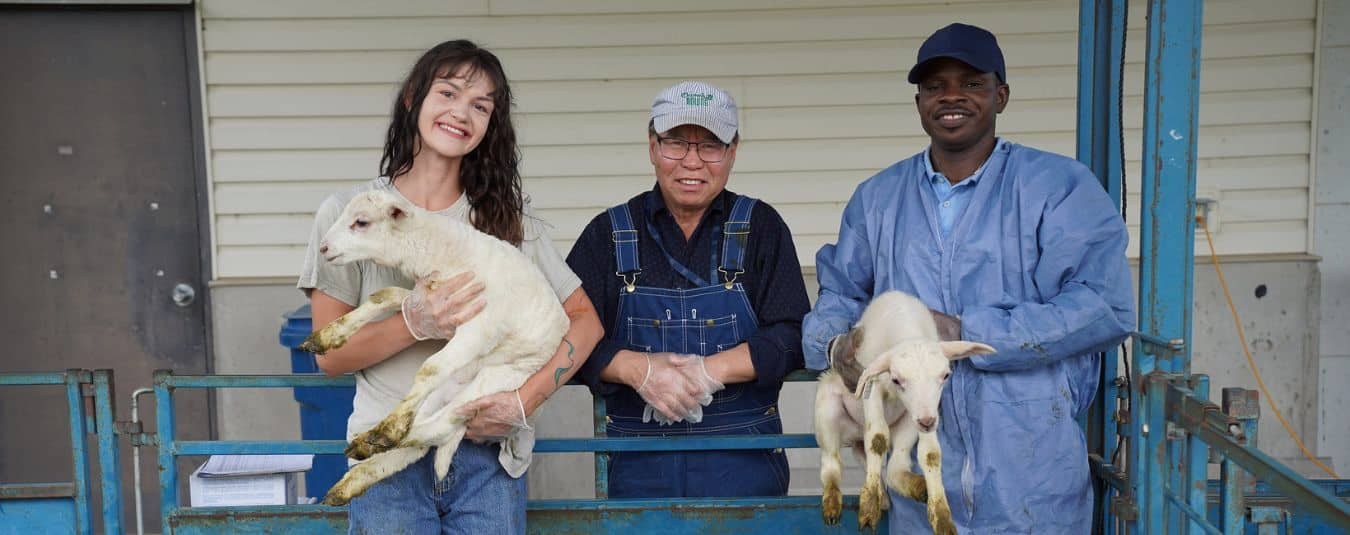Animal Science

Are you interested in animal science research?
We are dedicated to sustainable small ruminant, aquaculture, and poultry production systems. The small ruminant programs are focused on selections for lean meat growth, resistance to foot rot and gastrointestinal parasite infection, improvement of organic production performance, out-of-season breeding and reproductive efficiency. The aim of the aquaculture project is to enhance farmed food-fish production methods and feed efficiency. The role of the poultry project is to conduct feasibility investigations for outdoor pasture-based poultry production on small farms. These studies are highly integrated between research, extension, and education at Lincoln University as well as cooperation with producers and other institutions.
Food & Agricultural Science National Needs Graduate Fellowship (NNF):
Funding for USDA NNF fellowships for the Master of Science (MS) degree in Sustainable Agriculture were granted to Lincoln University of Missouri.
Starting May 1, 2021, there will be six fellowship awards available to applicants who have United States citizenship and are pursuing a MS in Integrated Agriculture at Lincoln University of Missouri, Graduate Studies. This award offers two years of support for applicants officially accepted for the scholarship.
Application for the fellowship award is open until April 30, 2023, unless all six applicants have been officially accepted for the award prior to this date.
The fellowship's stipend level is maintained as NNF grant stipulation. The MS candidates can select or emphasize their research project or choose specialization in small ruminants, aquaculture or poultry production. Graduates or graduating seniors of agriculture, animal science, biology or any other related field will be considered for these awards.
The candidates will be selected in accordance to the Lincoln University graduate student administration criteria and policy. Minorities and students of underserved communities are especially encouraged to apply for the scholarships.
For more information about fellowships, please contact Dr. Tumen Wuliji below.
Learn About Us
Breeding small ruminants for lean meat, disease resistant, and out-of-season production. The following objectives are being investigated:
- Evaluation of lean meat selection response and efficiency in Katahdin sheep. This project is to investigate the efficiency of lean meat selection, develop a lean meat breeding index, and demonstrate a sustainable lamb production system. A live scanned ultrasonographic measure of loin muscle area, width, depth, and backfat thickness (over 12th-13th rib) traits were formulated for an expected progeny difference (EPDs) value for preliminary selection lists. The lean sheep muscle selection project will facilitate the selection of animals for greater muscling, higher ADG and growth, and the yielding of heavier lamb carcasses with high-valued shelf products.
- Feasibility study – an out-of-season breeding system for organic lamb production. This project initiative will help producers to increase the profitability by increasing the supply of lamb and cabrito to the marketplace on a year-round basis. Animal performance and health will be monitored by regular body weight, ADG, body condition score, fecal eggs count and FAMACHA® scoring. Also, fall lamb production regimen could be coincided with favorite forage growth and grass feeding, and avoid the gastrointestinal parasitism and the use of anthelmintics.
- DNA marker assisted selection for foot rot resistant sheep flock. Foot rot is a highly contagious disease, infecting sheep, goats, cattle, and some wild ungulates. This objective is to conduct genetic screening, identification, and DNA marker (DQA2 gene marker) assisted selection of foot rot resistant genotypes within sheep breeds or flocks. Resistance heritability and other correlated parameters in relation to the gene marker or immune response parameters will be estimated.
- Sustainable gastrointestinal parasite control in small ruminants.
Feasibility study - Use of heritage breeds for pasture-based poultry production on small farms.
The main objectives of this research are to:
- identify common production practices used and challenges faced by small-flock poultry producers in Missouri,
- evaluate the suitability of dual-purpose heritage breed chickens for small-scale, pasture-based egg and meat production,
- evaluate the use of mobile and day-range pastured poultry models for egg production, and
- determine consumer acceptance and willingness to purchase heritage breed chicken meat. Together, this information can be used to develop a model to help small-flock producers make economic and agribusiness management decisions regarding the profitability and sustainability of using heritage breeds in pastured poultry production systems.
Promoting food-fish performance through market-size using alternative feedstuffs. This project is to evaluate larval Darkling Beetle Tenebrio molitor frass, Hemp Cannabis sativa seed and soybean protein concentrate as for replacers of fishmeal and plant derived binders to promote pellet integrity post-ingestion for fish species with potential for production and marketing as food in the Midwest by completing the following objectives:
- to compare value of Darkling Beetle frass, hemp seed meal, and soybean protein concentrate as replacers for fishmeal in fingerling diets;
- to compare tapioca flour and carrageenan in feed formulations with optimal particle milling size on growth performance, nutrient leaching and gastric emptying in fingerling Largemouth Bass;
- to rear rainbow Trout, Largemouth Bass, Bluegill and Black Crappie through market size using Darkling Beetle frass and hemp seed meal as significant portions of the respective feed formulations; (d) to demonstrate processing and sales of food-fish to producers and consumers.
Contact Information:

Principal Investigator/Associate Professor Animal Science
109 Small Animal Research Facility
1220 Chestnut St
Jefferson City, MO. 65101
P: (573) 681-5377
E: WulijiT@LincolnU.edu
